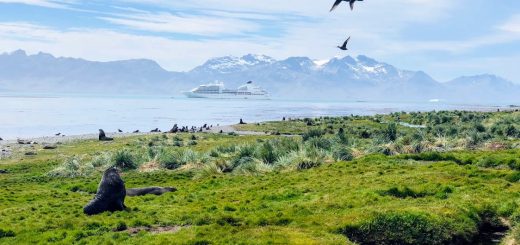
若敏:南极之恋10:Copper Bay 遇见马可罗尼企鹅
《南极之恋(10):copper Bay 遇见马可罗尼企鹅》
若敏
Day 8 – December 26, 2019 – Cooper Bay, South Georgia
Latitude: -56.65° Longitude: -40.76°
2019年12月25日在Salisbury Plain平原与王企鹅亲密接触之后,Quest邮轮从南乔治亚岛的西北海岸往东南方向驶去。
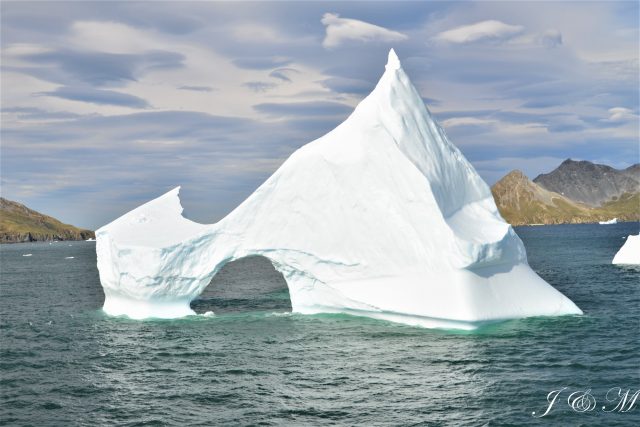
12月26日清晨,我们到达了风景如画的库珀湾(Cooper Bay)。从地图上可以清晰地看到库珀湾和库珀岛的位置。

库珀岛是一个小岛,长2英里(3.2公里),位于南乔治亚岛东南端,在Drygalski峡湾入口的北侧。 它是由英国探险队在詹姆斯·库克(James Cook)于1775年发现的,并以跟随库克船长到达此地的罗伯特·帕利瑟·库珀(Robert Palliser Cooper)中尉名字命名。
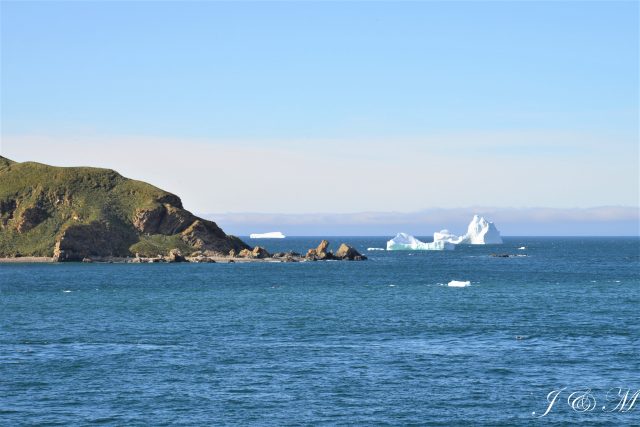
一条可通航的水道Cooper Sound宽约1英里(1.6公里),将Cooper岛与南乔治亚主岛的海岸隔开。 有一个小海湾,称为库珀湾(Cooper Bay ),位于大陆上海角Vahsel西南1.3英里(2.1公里)和库珀岛西北1英里(1.6公里)处,向南乔治亚岛的东南端缩进,其名称源自库珀岛。该岛的最高点达到416米(1,365英尺),岛的上部高于雪线。
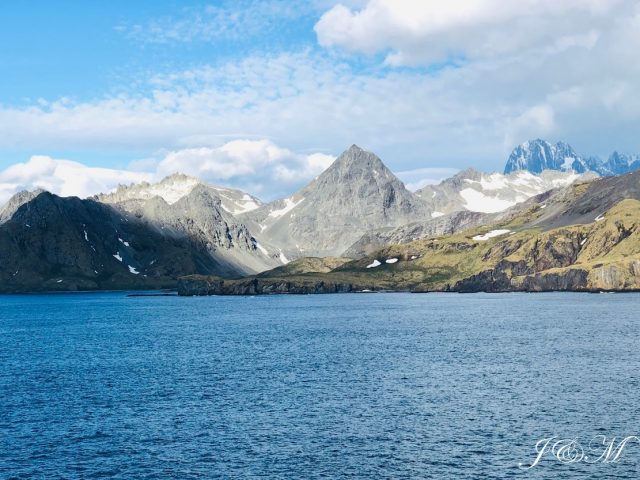
船上的专家介绍说:早年捕鲸船将大陆上的老鼠带到南乔治亚岛,导致老鼠泛滥,破坏了动植物的生态平衡,近几年的灭鼠行动,初见成效,而库珀岛是极少数的无老鼠岛之一,是南乔治亚岛的特殊保护区,拥有大量海鸟,12,000对黑眉信天翁,王企鹅、帽带企鹅和金图企鹅,特别是有20,000只马可罗尼企鹅(也叫通心粉企鹅)。 还有许多海狗和海豹,这里是为数不多的未被人类涉足的地方之一,岛上满是草丛。
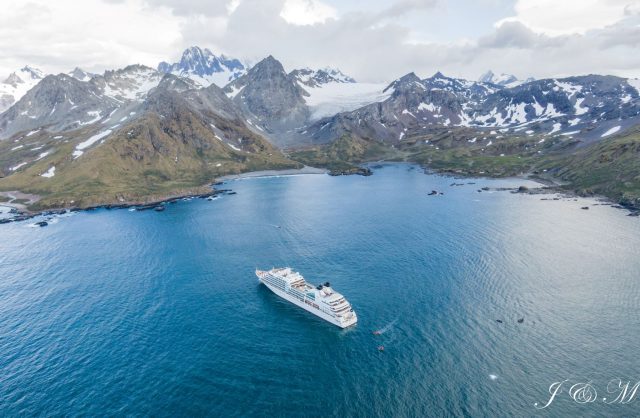
我们邮轮的锚地,坐落在库珀岛(Cooper Island)和库珀湾(Cooper Bay)之间,船上的摄影师用无人机拍摄出的景色令人叹为观止。一般游客是不能携带无人机上船的,摄影师是以邮轮公司的名义,花重金才申请到许可证。
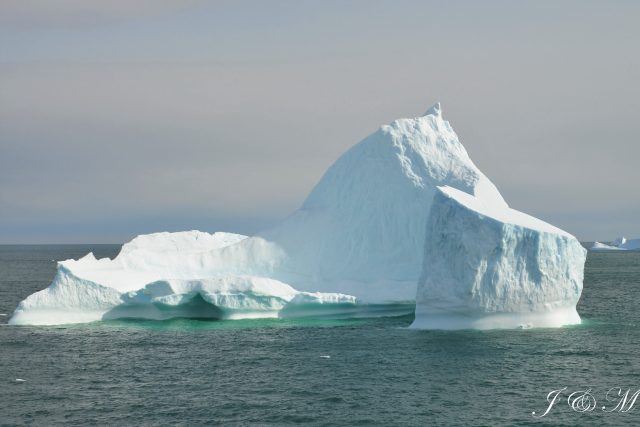
推开凉台门,眼前的景致让我一叹再叹,千年冰冻的淡蓝色冰块,纯粹和精致,千姿百态。大自然的鬼斧神工,让人类的想象空间无限放大,人工无法雕琢出如此空灵而纯净的艺术品,无法用言语解读和表达心中的赞美和震撼。
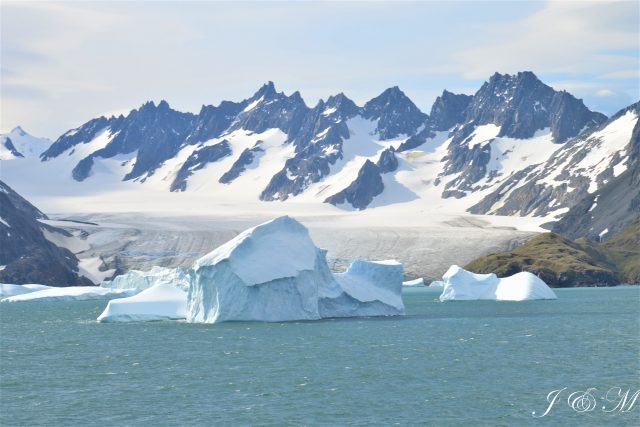
运气实在是不错,湛蓝的天空,通透清澈,远远望去,大大小小的冰山,在海中漂浮。船长在广播中告知大家,我们遇到了难得一见的好天气。但是海滩上布满了企鹅和海豹,出于对繁殖期动物的保护,这里不能登陆,只能巡游,而我们红队将在早上8:00第一批参加巡游。
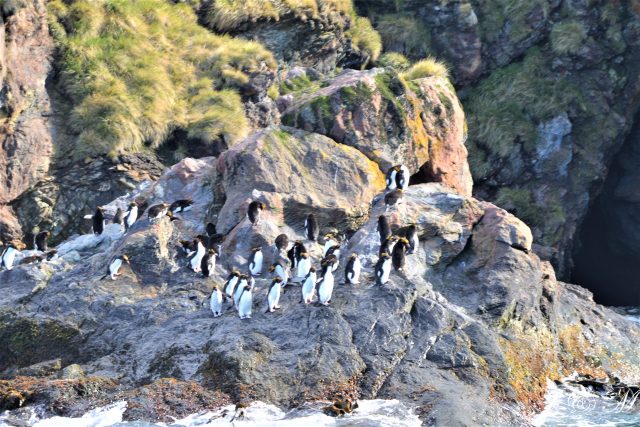
吃完早餐后,就穿上冲锋衣,带齐所有装备,广播声如同号角一般吹响,我和Jack急忙走向集和地点,换上雪地靴。
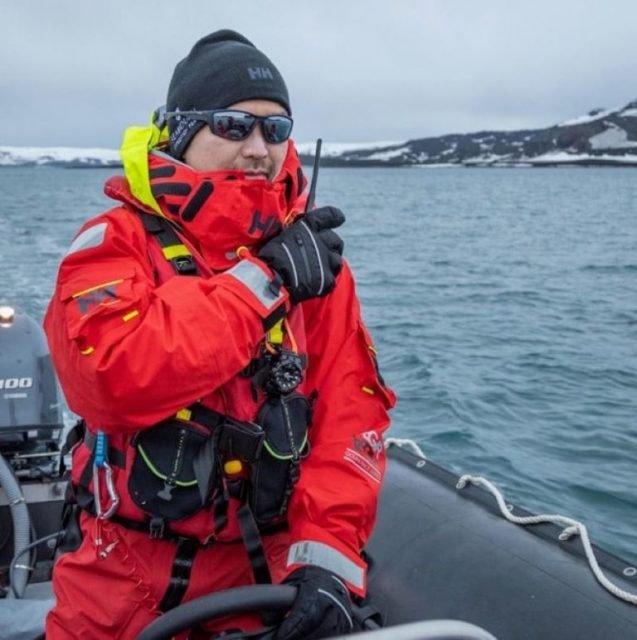
动作快,让我们第一批登上冲锋艇,舵手是来自菲律宾的探险队员Hansen,他轻车熟路地把冲锋艇开到了马可罗尼企鹅(Macaroni penguin)栖息的海岸山崖边。
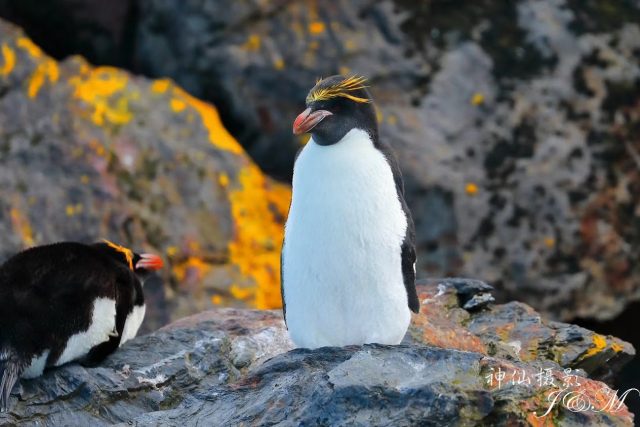
这是我第一次看到马可罗尼企鹅,头上装饰着金黄色的凤冠,红色的丹凤眼,看起来有点夸张,但很威严,别看它个头不大,却勇敢地生活在风高浪急的海岸悬崖上,练就了在恶劣环境下求生的本领。在求偶时,雄企鹅常常载歌载舞,以求得雌企鹅的青睐。一旦抱得美人归,宠爱有加,形影不离,温情脉脉,可谓企鹅里的爱情典范。这种企鹅体型不大,身高约七十厘米,体重3.5-4公斤重。在陡坡上行走是它的强项。
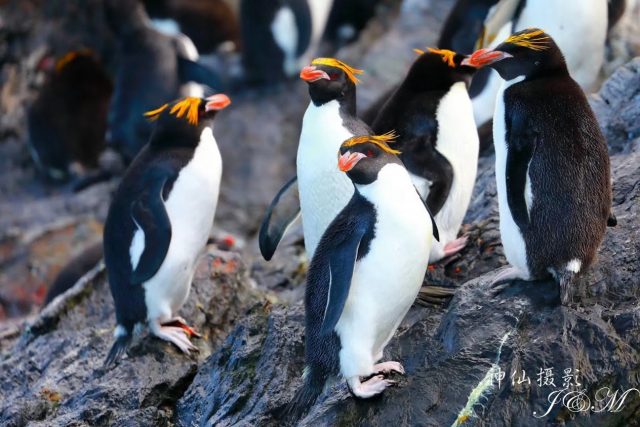
馬可羅尼企鵝,又稱長冠企鵝、通心粉企鵝,1873年,由德国科学家约翰.勃兰特(Johann Friedrich von Brandt)命名。它的学名(chrysolophus )取自古希腊语,为金色头冠之意。这是由于马可罗尼企鹅的头顶上有几束标志性的金色羽毛。
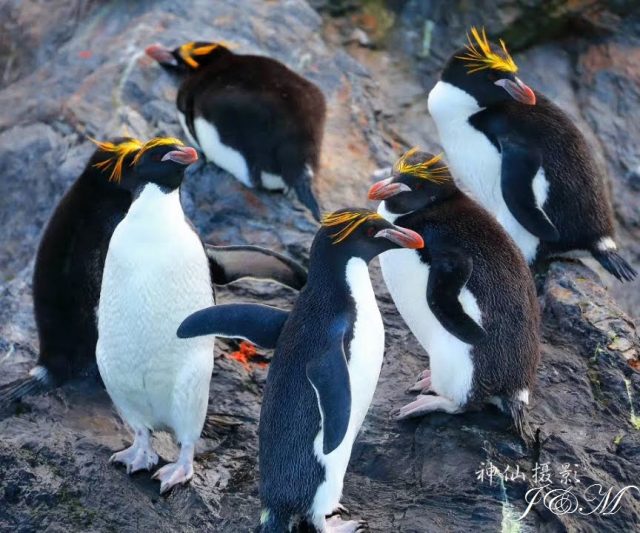
「馬可羅尼」听起来特别熟悉,没错,确实是來自英文的「Macaroni」,而這個企鹅的名字又源自於英國的南极探險家們,当时這個字多指18世纪英国的一群人,他们崇尚義大利文化、生活奢侈、打扮時髦,也常常旅行,炫耀自己的冒险经历,用各种话题和装扮,证明自己的高贵和脱俗。类似于国内最近热门的“凡尔赛“话题,大概是當初發現這群小企鵝的時候,英国探险家認為它們的金色凤冠和這群花花公子的髮型十分相似,也因此赋予了馬可羅尼的稱呼。
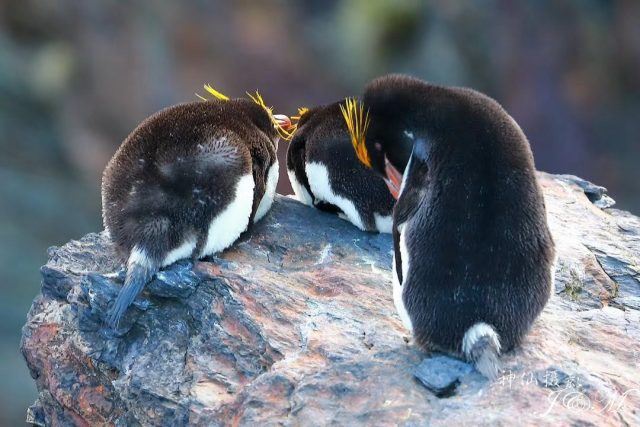
馬可羅尼企鵝的第二個名字「長冠企鵝」,是根據它們長長的金黄色凤冠而來。但是,馬可羅尼企鵝為什麼會有「通心粉企鵝」的稱呼呢?其實馬可羅尼企鵝與通心粉沒有什麼直接關係,只是Macaroni最常用的中文翻譯就是通心粉,一開始可能是字面翻譯的關係,但是現在通心粉企鵝的名字也廣為流傳。金黄色的凤冠看起来挺像通心粉的形状,也渐渐地被人们所接受。
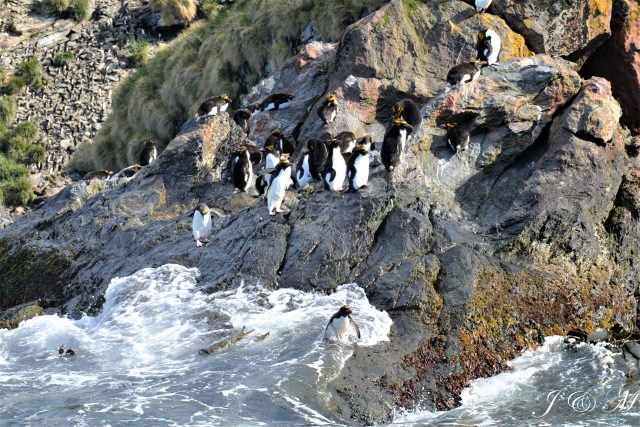
马可罗尼企鹅曾经是繁殖数量最多的企鹅之一。不幸的是,自1970年代以来,在南乔治亚州的马可罗尼企鹅数量已大大减少,从20世纪70年代到21世纪初,马可罗尼企鹅繁殖的数目下降了70%以上。人们认为这种下降,有一部分原因是由于南极海豹海鸟种群的不断恢复,马可罗尼企鹅遇到天敌捕杀幼企鹅,另外海豹与之争夺磷虾,海洋学变化影响了他们觅食地区食物供应等,都是原因之一。探险队员说,如果按照这样的速度下降,不久的将来,马可罗尼企鹅就会走到濒临危险的边缘。大自然的生存法则就是如此残酷,让人扼腕。
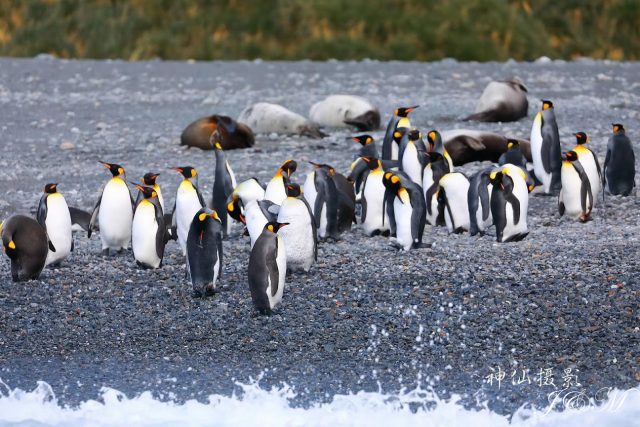
除了马可罗尼企鹅,在库珀湾还可以看到王企鹅King,金图企鹅Gentoo和帽带企鹅Chinstrap。世界上没有多少地方可以在一个位置看到四个企鹅物种。库珀湾便是其中之一,确实令人大饱眼福。巡游中,还看到巨鹱、蓝眼鸬鹚、象海豹等众多的野生动物。巡游时,天气非常好,望着周边的冰山和湾里五彩的海带,心情愉悦。
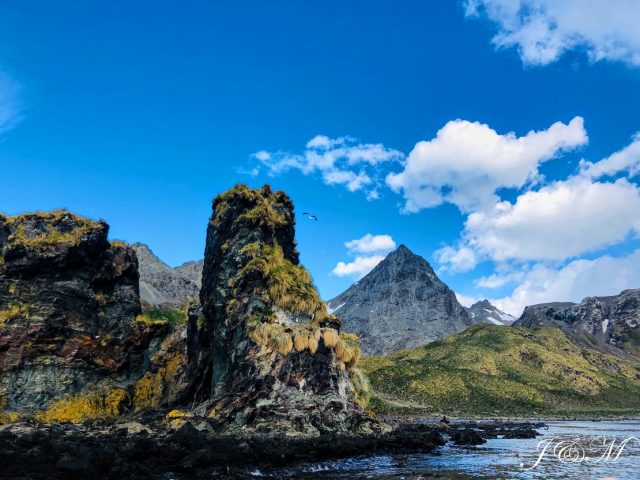
库珀湾有起伏的山峦和冰川,较低的山坡上覆盖着一层翠绿的草丛。企鹅和海豹,在海湾的沙滩上、草丛中繁殖,蜕皮和觅食。这里是动物的天堂。
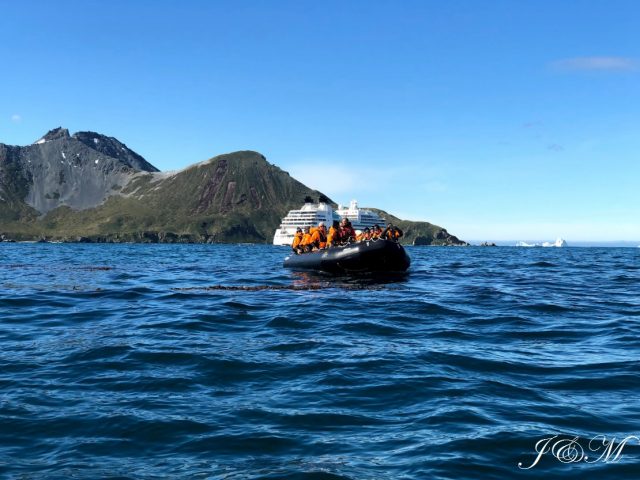
忽然,探险队员指着岸边一只睡着的豹斑海豹说,这是企鹅的杀手,它最喜欢的食物就是企鹅。但是,海豹周围有许多穿梭的王企鹅和金图企鹅,似乎并不畏惧豹海豹的存在,我们十分好奇,探险队员介绍说,豹海豹已经吃饱了,正在睡觉,养精蓄锐,所以不会打扰企鹅,一旦进食的时间一到,小企鹅就难逃魔掌了。王企鹅个头太大,它一般不会去吃,遇难的是个头小一点的企鹅,马可罗尼企鹅,在这里常常首当其冲地被吃掉。
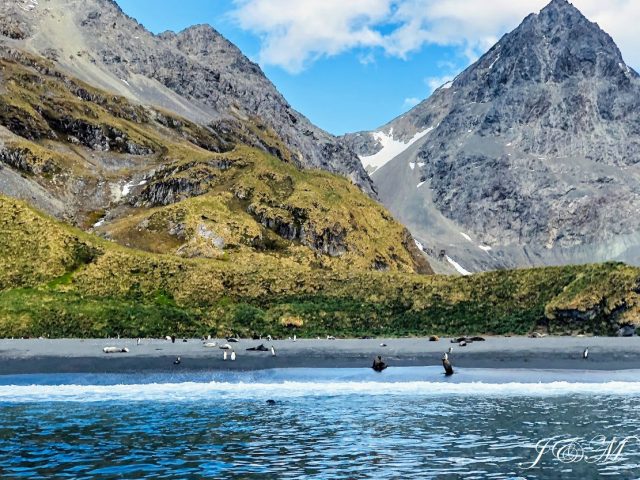
我们坐在冲锋舟上尽情地欣赏着天空、岸边、水上的各种飞禽走兽的精彩表演,90分钟的时间,一下子就过去了。顺利地返回大船,接着去听了讲座,享受美食,午饭后,Quest就启航了,一路向南。
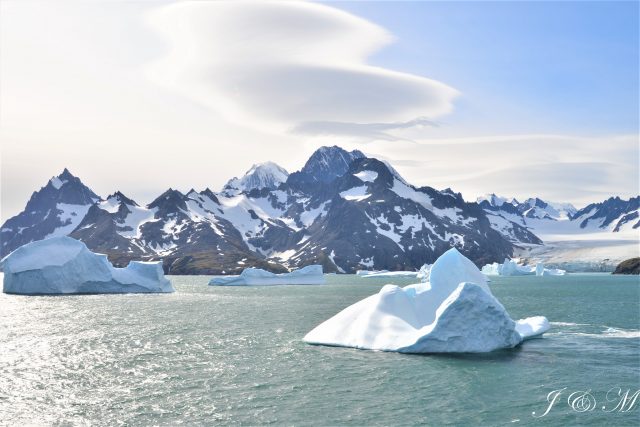
意外的收获是在船上看到南极特有的柱状云。柱状云Lenticular clouds 在对流层形成,通常垂直于风向。它们的外观通常可与碟子媲美。平流层下部形成的珠状云有时具有透镜状。柱状云主要有三种类型:高积云直立柱状透镜(ACSL),平积层直立柱状透镜(SCSL)和卷积直立柱状透镜(CCSL),它们在地面上的高度不同。由于它们的独特外观,有点像不明飞行物(UFO)。
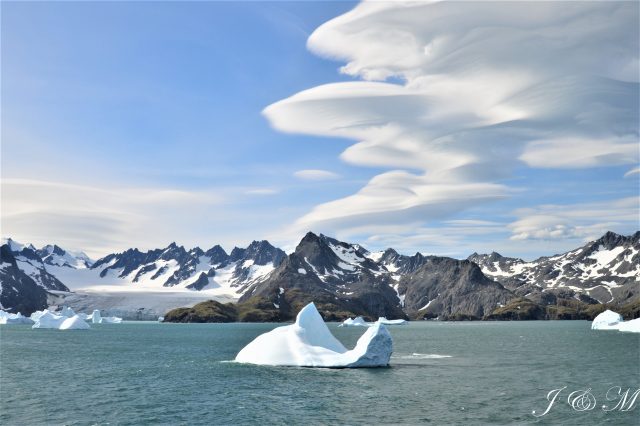
在离开库珀湾时,Quest邮轮在船长的带领下,经过Drygalski峡湾的入口,那里是一群冰山聚集的地方,海与天,冰与雪,蓝与白两种颜色交替着在眼前出现,让人沉浸在梦幻般的诗情画语之中,无边的寂静中,只有来自冰山间隙中的呢喃,进入忘我,忘记寒冷,忘记喧嚣的尘世,感叹大自然的天然雕琢和出神入化,沉浸在美丽的遐想之中。风越来越大,宣告着我们的船正在进入西风带。
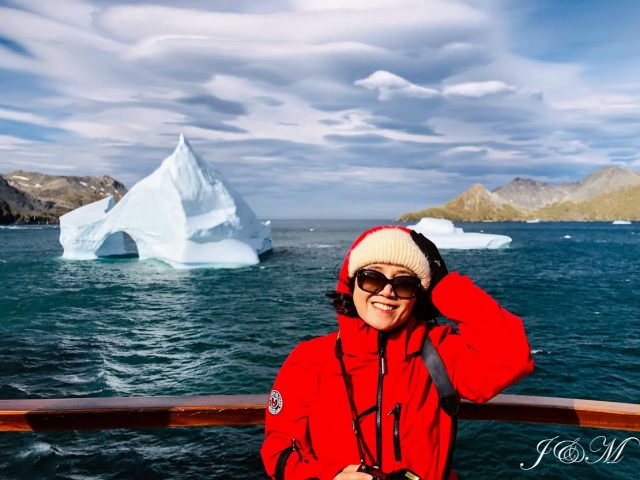
结束了库珀湾的巡航,南乔治亚岛的航程即将进入尾声,我们依依不舍与之告别。目睹企鹅们与恶劣的环境和天敌不断地抗争,生生不息地繁衍着后代,感慨万千。马可罗尼企鹅勇敢地站在海边悬崖上的身影,深深地触动着我。南极之行,让我更加体会到,一定要珍爱和保护地球上的最后一片净土。
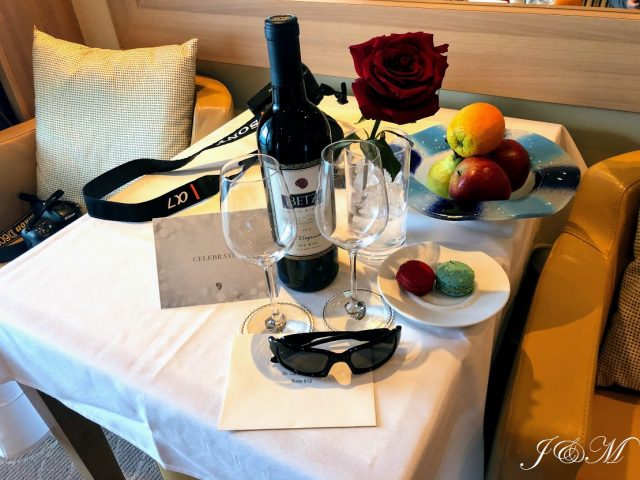
这一天是Jack的生日,这次南极之行也是为他定制的生日礼物,我们幸运地在SeaBourn Quest邮轮上的米其林Grill by Thomas Keller 餐厅订到了位置。服务员贴心地叠了一个毛巾小熊,并附上祝贺的话语。船上还特别赠送了一瓶红酒。
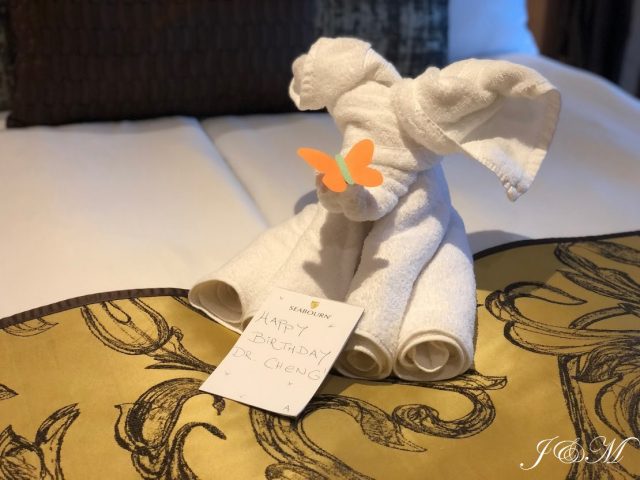
生活中是需要仪式感的。村上春树说过:“仪式感是一件很重要的事,如果没有这些小确幸,人生不过是干巴巴的沙漠而已”。到美国后,慢慢接受了美国文化里那些有仪式感的形式。中国的文革十年,曾经将仪式感碾压到极致,泯灭了人间的善良和美好。其实无论爱情、亲情还是友情,仪式感是很好的感情纽带,因为表达了内心的关注和重视,有着不可替代的温暖。
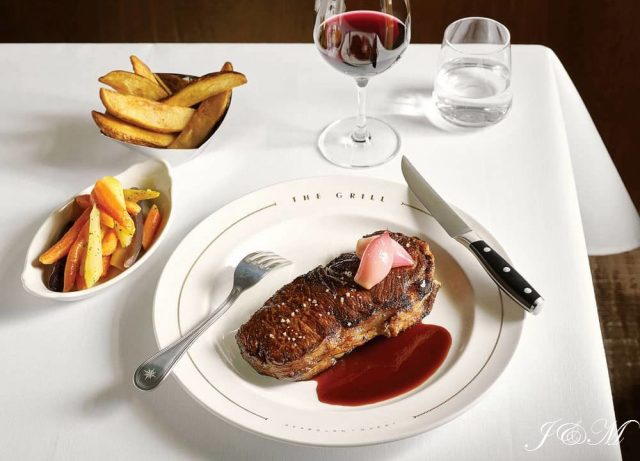
仪式感是什么?它让生命里的某些时刻变得独一无二,感觉有人疼,有人爱,不枉来世一程,生活里不是只有柴米油盐酱醋茶,还有琴棋书画诗酒花。
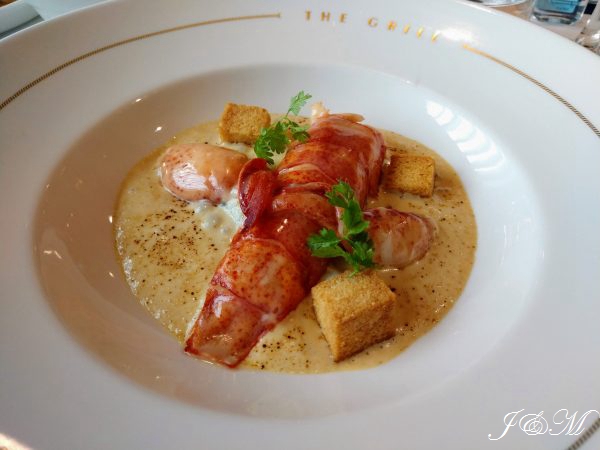
(我的主菜是龙虾)
让尼采的名言成为这个特别日子的结尾:“每一个不曾起舞的日子都是对生命的辜负。”
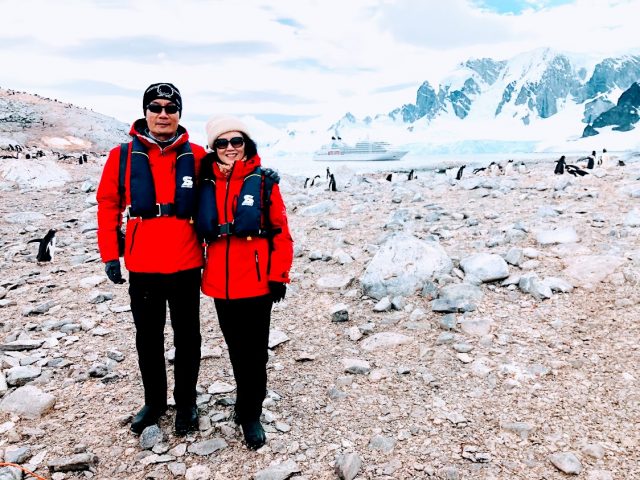
这篇迟来的祝福送给Jack!
Jack,生日快乐!
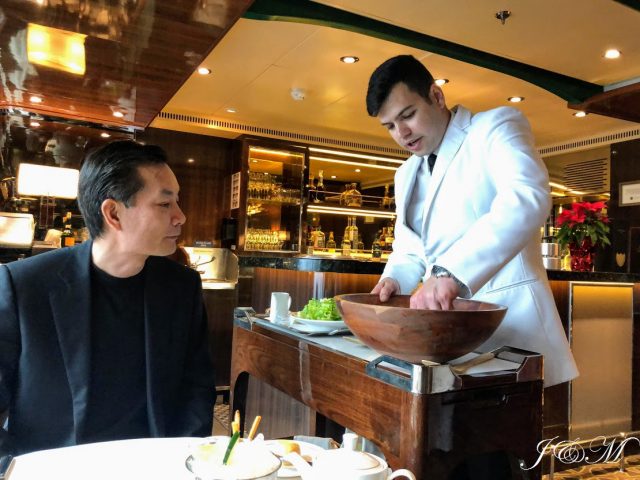
(餐厅手工制作凯撒沙拉)
最后,附上船上探险队员的英文日记,作为留念和记录。
After a spectacular adventure yesterday in the Bay of Isles, Quest made its way from the north-western shore of South Georgia to its south-eastern tip. We arrived early this morning in the picturesque Cooper Bay, porpoising penguins and fur seals escorting us to our anchorage. Nestled between Cooper Island and Cooper Bay, the views from Quest were breathtaking, made even better by the clement conditions. A combination of light winds, a blue, sunny sky that was later transformed by stacks of lenticular clouds that are a characteristic feature of the South Georgia skies, showed off the island in all its glory. The rugged mountainous topography dissected by the Quensel Glacier, and cloaked on the lower slopes by a verdant green layer of tussac grass with a multitude of wildlife breeding, moulting and foraging along the coastal strip, the inshore waters teeming with penguins, seals and petrels, and a number of icebergs in the waters offshore all made for an awe-inspiring experience. And, this was our experience of Cooper Bay before we had even left Quest to explore the nooks, crannies and beaches of the bay by zodiac. Heading out on the zodiacs across the calm, sparkling sea towards the shore, we came across playful seals in the water, and upon arriving in the inshore zone, festooned with kelp, we were afforded wonderful views of a variety of penguins ashore.
This was our first opportunity to see the magnificent Macaroni Penguins, regally adorned with their bright yellow head plumes. Their common name harks back to the 'dandies' - the young wealthy men of 18th century Britain who attired themselves extravagantly, donning hats with fanciful feathers. In order to expand their knowledge of arts and culture, it was common for the dandies to undertake a grand tour of Europe. They returned with stories of their sophisticated adventures, and all sorts of accoutrements that served as proof of their increased level of worldliness. During this time, the dandies acquired a taste for macaroni pasta from Italy and started importing it in large quantities to Britain. This led to a new nickname for the feather-hatted dandies - the Macaronis. When early English seafarers first encountered the curious looking penguin in the sub-Antarctic resplendent with yellow head plumes, they were reminded of the Macaronis back home, and so the species was named.
The Macaroni Penguin is the world's most abundant penguin, and it is also the most numerous penguin breeding at South Georgia, with a population of approximately 1 million breeding pairs. Although large, the South Georgia population has unfortunately declined substantially since the 1970s when it was estimated to number almost 5,5 million pairs. This decline is thought to be due, at least in part, to the ongoing recovery of the Antarctic Fur Seal population with which the Macaroni Penguins compete for krill, together with oceanographic changes that have influenced the availability of food in the areas they forage. The broader Cooper Bay area supports approximately 25,000 pairs of Macaroni Penguins, with about 100,000 pairs breeding at Cooper Island, across the way.
In addition to the Macaroni Penguins, we were also able to see King, Gentoo and Chinstrap Penguins. There are not many places in the world where it is possible to see four penguin species in a single location. Cooper Bay is one of those locations. Some of the other highlights from an ornithological perspective included Light-mantled Albatrosses harnessing the winds to soar elegantly in the bay, South Georgia Shags nesting amongst tussac clumps on the faces of the coastal cliffs, both Northern and Southern Giant Petrels loitering on the beach in search of weak or dead birds and seals to kill or scavenge. And who can forget the ubiquitous and characterful sheathbills. These inquisitive and quarrelsome birds continually scrap over food items, or potential food items, whether this means niggling away at the flesh of a seal or bird carcass on the beach, intercepting the food that adult penguins attempt to regurgitate for its chick or foraging on freshly deposited penguin guano. These, and almost anything organic, are all on the sheathbill's menu. Novel items, such as tourists' boots or tripod legs are routinely inspected by the industrious sheathbills in case they prove to be edible.
We were also treated to a variety of the region's seals. In addition to the two abundant and commonly accounted species that we observed over the previous two days - Antarctic Fur Seals and Elephant Seals - we were afforded good views of a Leopard Seal resting on the main beach of Centre Cove.
After a fantastic day out on the zodiacs, it was time to leave the wonderland of Cooper Bay to start making our way further south for the next chapter of our adventure. As we passed the entrance of Drygalski Fjord, where a group of icebergs had assembled, the wind increased as if to indicate we were entering the realm of the gale birds. A little while later, we passed Cape Disappointment, the last land we will see until we reach Antarctica.
Cape Disappointment was named by Captain James Cook during the second of his three voyages of exploration aboard the HMS Resolution. Cook circumnavigated the world in search of the 'Southern Continent'. In January 1775, the Resolution arrived at the entrance of Possession Bay along the north coast of South Georgia, where Cook made the first landing on the island. He hoped that this land would prove to be part of Antarctica, the Southern Continent. However, when they rounded the southernmost promontory, and looked northwest to the point at which they had arrived five days earlier, Cook realised that what he thought might be the continent was plainly a long narrow island. He named it the Isle of Georgia in honour of King George III. Understandably, he named this southern promontory Cape Disappointment.
Our visit to South Georgia was the antithesis of disappointing, and we departed feeling exhilarated by the adventures experienced there and excited about those still to come.
Written by Anton Wolfaardt – Photos by Aidan Klimenko and Kieran Buckley
(摄影Jack、若敏,选用神仙的几幅摄影作品,十分感谢,还有几幅摄影来自船上摄影师,一并致谢)



